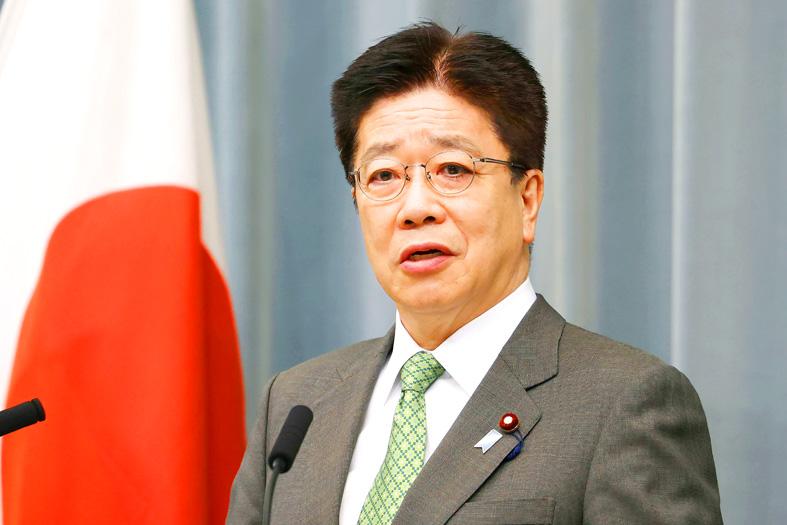Japan yesterday extended its sanctions on North Korea for another two years as Pyongyang continues to develop nuclear weapons without any progress in resolving the abductions of Japanese nationals.
Japan bans all trade between the two nations and prohibits North Korean-registered ships from entering its ports, except for humanitarian purposes. It also bans flights between the two nations.
Tokyo also abides by UN sanctions against North Korea’s nuclear and missile programs. They include an arms trade ban, a freeze of North Korean assets, a ban on people exchanges, and restrictions on education and training.

Photo: AP
Japanese Chief Cabinet Secretary Katsunobu Kato yesterday said the Cabinet had decided to extend the sanctions, which were set to expire on Tuesday next week.
North Korea test-fired two ballistic missiles on March 25 for the first time in about a year, which Japan has condemned as a breach of UN Security Council resolutions.
Japan, the US and South Korea have called for full implementation of the UN sanctions and for ensuring international efforts to denuclearize North Korea.
In 2002, North Korea admitted to kidnapping 13 Japanese nationals in the 1970s and 1980s to train spies in Japanese language and culture. Five of them were allowed to return to Japan later that year, and Pyongyang says the others had died or never entered the North.
Japan believes more people might have been abducted and that many might still be alive. Questions over their fate, along with North Korea’s nuclear and missile development, have kept relations frozen between the two nations.
Japanese Prime Minister Yoshihide Suga has made resolving the abduction issue a high priority for his administration and has said he is open to meet with North Korean leader Kim Jong-un for talks without setting any preconditions.
Tokyo began limited sanctions against North Korea in 2006 and has since extended and expanded them.

By 2027, Denmark would relocate its foreign convicts to a prison in Kosovo under a 200-million-euro (US$228.6 million) agreement that has raised concerns among non-governmental organizations (NGOs) and residents, but which could serve as a model for the rest of the EU. The agreement, reached in 2022 and ratified by Kosovar lawmakers last year, provides for the reception of up to 300 foreign prisoners sentenced in Denmark. They must not have been convicted of terrorism or war crimes, or have a mental condition or terminal disease. Once their sentence is completed in Kosovan, they would be deported to their home country. In

Brazil, the world’s largest Roman Catholic country, saw its Catholic population decline further in 2022, while evangelical Christians and those with no religion continued to rise, census data released on Friday by the Brazilian Institute of Geography and Statistics (IBGE) showed. The census indicated that Brazil had 100.2 million Roman Catholics in 2022, accounting for 56.7 percent of the population, down from 65.1 percent or 105.4 million recorded in the 2010 census. Meanwhile, the share of evangelical Christians rose to 26.9 percent last year, up from 21.6 percent in 2010, adding 12 million followers to reach 47.4 million — the highest figure

A Chinese scientist was arrested while arriving in the US at Detroit airport, the second case in days involving the alleged smuggling of biological material, authorities said on Monday. The scientist is accused of shipping biological material months ago to staff at a laboratory at the University of Michigan. The FBI, in a court filing, described it as material related to certain worms and requires a government permit. “The guidelines for importing biological materials into the US for research purposes are stringent, but clear, and actions like this undermine the legitimate work of other visiting scholars,” said John Nowak, who leads field

LOST CONTACT: The mission carried payloads from Japan, the US and Taiwan’s National Central University, including a deep space radiation probe, ispace said Japanese company ispace said its uncrewed moon lander likely crashed onto the moon’s surface during its lunar touchdown attempt yesterday, marking another failure two years after its unsuccessful inaugural mission. Tokyo-based ispace had hoped to join US firms Intuitive Machines and Firefly Aerospace as companies that have accomplished commercial landings amid a global race for the moon, which includes state-run missions from China and India. A successful mission would have made ispace the first company outside the US to achieve a moon landing. Resilience, ispace’s second lunar lander, could not decelerate fast enough as it approached the moon, and the company has